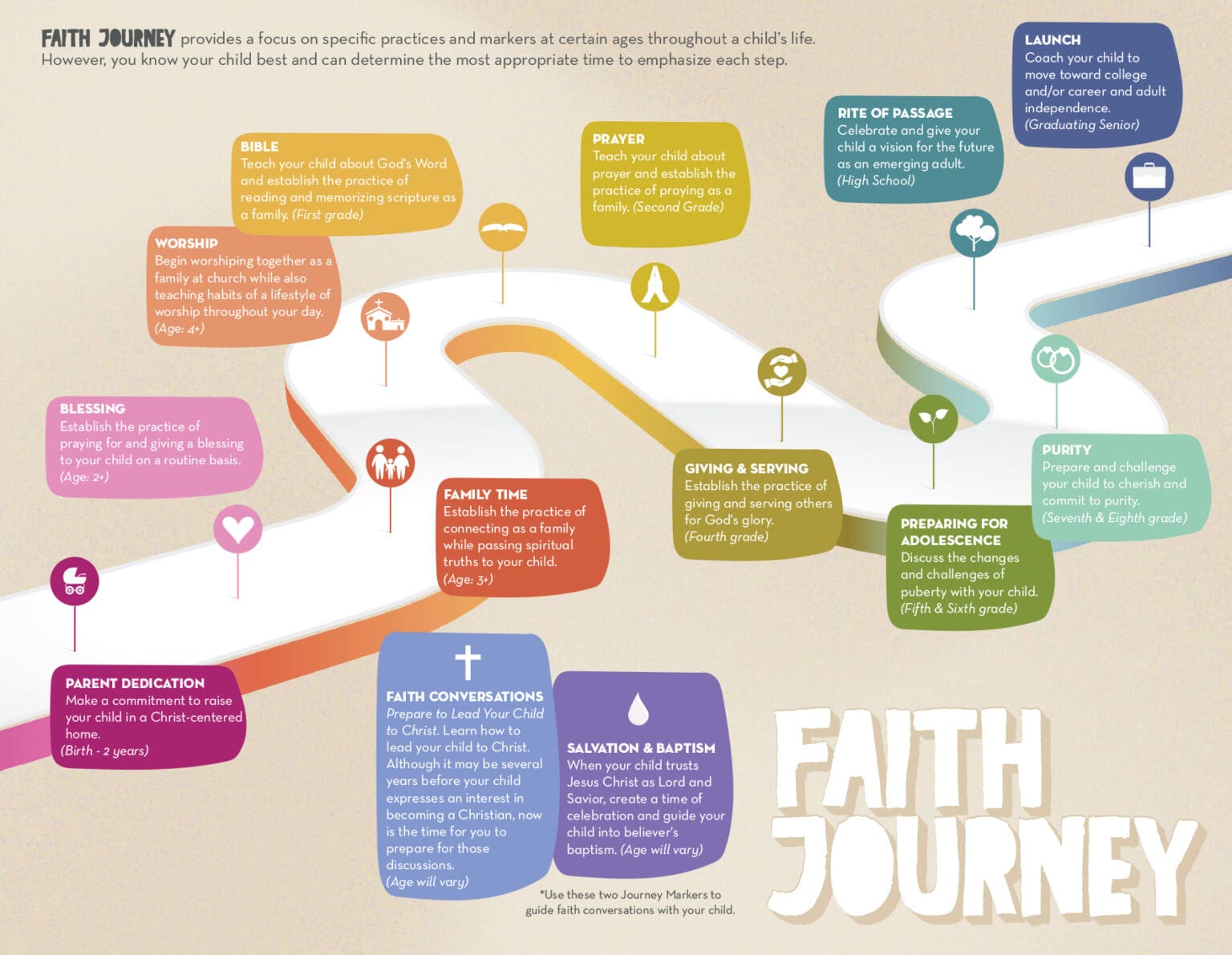Dear Parent:
One of the core values of First Baptist Arlington is that God designed the family as the primary place for discipleship. The Faith Journey initiative exists to partner with you as you guide your child’s spiritual journey one step at a time. Age appropriate kits have been created to help you leverage the best faith formation strategy for your child’s stage of development. In this Purity kit you will find practical ideas and suggested resources to help you give your son or daughter a vision for living a life of purity.
Getting Started
To help you discuss purity with your child, this kit includes a Purity Checklist to help your child define appropriate boundaries. You will also find a My Purity Commitment card for your teen to complete.
We hope you find this kit helpful in the process of forming the faith of your child at home. Feel free to visit fbca.org/faithjourney to learn more or to determine if your child/children are ready for other Faith Journey markers.
Blessings,
The Young Families Ministry Team
Purity Checklist
It is wise to help an early teen establish clear boundaries BEFORE they face tempting or awkward situations. As soon as he or she begins taking an interest in the opposite sex, spend time together walking through the following discussion checklist to create healthy expectations and goals.
THE PURPOSE OF DATING:
Use the following statements to frame discussions with your teen about when they might be ready to consider dating.
WHAT DATING IS
- Spending time with the opposite sex to learn more about that person and to grow in friendship and relationship
- Building a friendship without the physical bonds reserved for marriage
- A journey to find a spouse for those approaching the age for engagement and/or marriage
WHAT DATING IS NOT
- A time to kiss, touch or other forms of intimacy before marriage
- A status symbol among peers impressed by those with a boyfriend or girlfriend
- A way to boost your own confidence through attention from the opposite sex.
MODESTY:
Demonstrate self-respect by establishing basic guidelines for dressing modestly, such as…
- Appropriate length on shorts and skirts
- Swimsuits that are appropriate for the situation and that cover what needs to be covered
- Tops must fully cover everything, even when bending forward
- This is not simply an issue for, or the responsibility of, our girls, there should be conversation about modesty for guys and girls
ACCOUNTABILITY:
In addition to mom and dad, encourage your teen to identify a close friend or two who shares the same values to help hold each other accountable to protect their purity.
DRAWING THE LINE:
Coach your teen to decide now what he/she will and will not do in a relationship with the opposite sex. Discuss the following summary of the natural progression of physical intimacy. Decide together where to draw the line in order to protect purity and prevent a broken heart.
- Flirting
- Side hugs
- Frontal hugs
- Holding hands
- Arms around each other
- Cuddling
- Kissing
- French kissing
- Touching/caressing with clothes on
- Petting/groping under or without clothes
- Oral sex
- Sexual intercourse
Complete a Purity Commitment - Download Here
DANGER ZONES:
Create a list of strategies that will help your child avoid potentially compromising situations, including...
- Never be in a house with the opposite sex without parental supervision.
- Stay in family areas of the house.
- No going in bedrooms.
- Doors of the room you are in remain open.
- Come straight home after a date. No parking.
- Set a limit on alone time to give the relationship regular breaks.
- Date only a person that has the same values as you.
- Only group date with friends until age 16 or 17.
EXIT PLAN:
Create an easy way for your teen to flee a tempting or risky situation with the opposite sex. Discuss possible “code language” they might use when calling or texting for a ride home such as “I’m having a great time, but I don’t feel well.” This will alert you that they need to leave without embarrassing them in front of others.
GRACE:
If your teen has already made mistakes such as viewing pornography or going too far with a boyfriend/girlfriend, read John 8 and ask God to help you model Jesus’ balance with the woman caught in adultery. You must clearly call the sin a sin so that your teen can receive grace through repentance. But offer hope by challenging him/her to start fresh and “go and sin no more.” Find an appropriate time to talk rather than react in the heat of discovering the sin. Coach them through the same steps to set new boundaries and accountability for the future. Offer grace and forgiveness, but also lead them in making a commitment from this point on to avoid further risk and harm to their purity. If necessary consider seeking help from a minister or professional.
Webster’s Dictionary defines “pure” as: “free from everything that might make dirty, change, or lower the quality; free from sin or guilt.” Purity is much more than refraining from sex or heeding a list of dos and don’ts. It is a positive, passionate existence that frees us to experience all God made us to enjoy. How do we help our children go against the norm and live a life filled with the freedom and joy that seeking to live a life of holiness and purity can bring?
Step One: Clarify the Standard
Psalm 119:9 says “How can a young person stay on the path of purity? By living according to your word.” While Jesus Christ was the only person to live a life of total purity, he invites us to follow his example by fulfilling the purpose for which we were made. When it comes to purity, our children need to understand that, as followers of Jesus, our bodies provide an opportunity to honor God through how we live our lives and how we treat our bodies. I Corinthians 6:18-21 says “Flee from sexual immorality …your body is the temple of the Holy Spirit… you are not your own …therefore honor God with your body.”
Step Two: Focus on Purity, Not Just Sex
It is important to help our kids know that God’s intention for sex is within the marriage relationship. But purity is much more than saying “No” to premarital sex. He has a great plan for our hearts, minds and actions. Teach your child that holiness and purity involves every area of life - not simply what we do with our bodies.
Step Three: Give a Positive Vision
Give a positive vision of the purpose and joy of sex in the context of marriage. Nothing gives a child a positive view of God’s design for passion like basking in the love of parents who cherish one another, who exhibit healthy and appropriate affection, and speak positively about the joys of marital intimacy.
Step Four: Delay Temptation
God made us with desires that are very good. But those desires can be awakened too early. So talk to your child about their bodies, about sex, and about God's intentions for sex before allowing them to date and continue dialogue after they start the process. The topic will be awkward, so try to make these conversations as normal as possible. For one child that could mean scheduling a regular coffee date; for another it might mean chatting while hunting or attending a sports event. Find some context for keeping the lines of communication open. Without parents creating the safety for these conversations, your child will likely never talk to you about it.
Step Five: Pray for Them
Commit yourself as a parent to cover your child in prayer. Pray specifically for purity in relationships, a healthy thought life, and integrity in all areas of their lives. Pray for a heart that is connected to Christ and a mind grounded in God’s Word.
Practical Ideas:
- Write letters to your child. Share your heart and scripture instead of rules. Give them a vision of God’s plan for their lives. Plan a time to talk about the letter after they’ve read it, at special breakfast or a coffee date. Listen to what they say and try to steer clear of teaching or lecturing.
- Have your child write out what they want in a future spouse. As they get closer to dating, have them pull that list out and talk through the potential individuals that they are interested in dating to see if they fulfill that list. Ask the following questions: What would your future spouse want from you in purity? What do you want from your future spouse?
- Use the Purity Checklist to help your child set boundaries and accountability to remain pure.
- Help your teen solidify a commitment to purity using the My Purity Commitment card included with this kit.
- Consider buying them a ring or other item as a symbol of their commitment. Remember that this is your child’s decision. Your job is to provide guidance, support and honest conversation.
- Participate in Merge Weekend with the Youth Ministry where students are given the opportunity to discuss these topics.
We’ve all heard the phrase “failure to launch” to describe young men and women who don’t make the transition into responsible adulthood. Unfortunately, many parents inadvertently keep their children from growing up and moving on due to overprotection and lack of intentionality. Whether your child is going to college, joining the military, or entering the workforce, you need to be intentional about successfully launching them toward becoming a healthy, responsible adult.
Be a good coach
As the parent of an older teen on the verge of adulthood, you are a very important coach. You can motivate, encourage, challenge and advise… but you can’t force. You can help them articulate what they believe, challenge their thinking, remind them of the “basics” already learned during earlier years… but the time has come for your child to truly own his or her own beliefs and choices. Provide a listening ear as they wrestle with and possibly question the values they learned as a child. Try to maintain a strong relationship that includes frequent, open dialogue.
Give perspective to big questions
During the transition into adulthood, your son or daughter will face big questions including: Where should I go to college? What kind of work should I do? Where should I live? What should I do with my life? Who should I marry? Direct your teen back to overarching principles from God’s Word. One of the last things King David said to his son, Solomon (1 Chronicles 28:9) provides a model for parents advising their emerging adults: “And you, my son, acknowledge the God of your father, and serve him with wholehearted devotion and with a willing mind.” In addition to the practical advice parents need to give related to setting goals, finding a job and choosing a spouse, we must also promote and emphasize basic Christian life principles.
Give a vision for marriage and family
Parents sometimes go to extremes to help a child prepare for college or the workforce but fail to prepare them for the important work of marriage and family. While some are called to life-long singleness, many young people will eventually get married and have a family. Encourage your teen to seek the Lord in discovering what God's plan is for their future. You have a vital part to play in helping your child prepare to leave your home and establish their own.
Keep letting out line
You can’t turn loose of the rope all at once! Leaving home is a process. It’s important that you assist your young adult in becoming increasingly independent over a period of several years. Talk about the challenges and opportunities of adulthood. Discuss various scenarios and potential options for dealing with them. Help your young adult understand the principle of “opportunity cost.” Saying “Yes” to one thing means saying “No” to other things. Continue to help your son or daughter own the consequences of their choices while the stakes are still lower and give them space to fail while you are still close by to help pick them up and learn from their failures.
Prepare them
Set your child up to succeed during this time of transition.
- Plan a special time together to discuss the Before You Leave card included with this kit. Use the conversation to identify areas that might require some extra coaching before they leave.
- Choose a particular book or resource to go through together. Schedule coffee dates to talk through specific topics.
- Write a launch letter to encourage your child. Let them know that you are praying for them during this season of transition. A sample letter is included with this kit (Above)
Intentional Faith Journey Plan
How will you be intentional this next year?
- Pray daily for and with my child.
- Consistently spend time in God’s Word.
- Bless my child daily.
- Create a habit of worship with my child.
- Serve together as a family.
- Coach my child to set healthy boundaries.
Recommended Resources
- Recommended Resources Every Young Woman's Battle: Guarding Your Mind, Heart, and Body in a Sex-Saturated World by Shannon Ethridge & Stephen Arterburn
- Every Young Man’s Battle: Strategies for Victory in the Real World of Sexual Temptation by Stephen Arterburn & Fred Stoeker
- The Gospel and Pornography by Russell D. Moore
- The Purity Code by Jim Burns
- Teaching Your Children Healthy Sexuality by Jim Burns


Questions?
Don't hesitate to ask!
Contact one of our Young Families ministers below.
Ryan Chandler - Young Adult Minister - ryan.chandler@fbca.org
Let us help you get connected.
Need more information?

